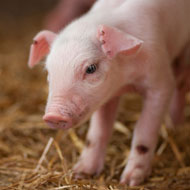“Worrying” reports of farmers trialling undocked pigs

“What we don’t want to see is people stopping docking without first addressing the risk factors for biting”.
Farmers are being warned not to rush into trials of undocked pigs, as it could result in bouts of tail biting.
The National Pig Association (NPA) said it has heard “worrying” reports of farmers embarking on such trials, possibly owing to fear of prosecution for routine tail docking.
In recent years, the European Commission has increased its focus on reducing tail docking in pigs. Member states, including the UK, are being asked to show how they are tackling the issue.
However, NPA’s senior policy advisor, Georgina Crayford, said farmers are not expected to stop docking immediately. She warned that this could be detrimental if it results in tail biting problems.
She explained: “What the commission wants to see is efforts to address husbandry and environmental risk factors for tail biting in order to make rearing pigs with intact tails more feasible.”
Rather than trialling batches of pigs without docking, NPA advises farmers to document the steps they have taken to reduce tail biting, such as checking ventilation, using different types of enrichment, reducing restocking rates, cleaning drinkers, changing genetics and ensuring better consistency in docked tail lengths.
“What we don’t want to see is people stopping docking without first addressing the risk factors for biting,” Crayford added. “If farmers want to trial pigs with full tails, we urge them to do it with their vet’s supervision and only after careful planning of how those pigs will be managed and a plan for dealing with an outbreak should it occur.
“DO NOT mix undocked pigs with docked pigs as uneven tail lengths is a risk factor for biting. Farmers could look to not dock their replacement gilts first as a trial.”
Farmers are advised to carry out a risk assessment to determine the risk factors for tail biting on their farm. A print-out risk report should serve as good evidence for inspectors, she added. Farmers should also keep good records of tail biting incidents, including the number of treatments administered to bitten pigs.



 The Federation of Independent Veterinary Practices (FIVP) has announced a third season of its podcast, Practice Matters.
The Federation of Independent Veterinary Practices (FIVP) has announced a third season of its podcast, Practice Matters.